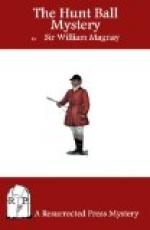“All the same,” Henshaw returned sourly, “one can hardly accept the inference that he came down here for the express purpose of making away with himself in your house.”
“No, I cannot understand it,” Morriston replied, as he turned and began to ascend the winding stairway.
On the threshold of the topmost floor he paused.
“This is the door we found locked on the inside,” he observed quietly.
Henshaw gave a keen look round, and nodded. Morriston pushed open the door and they entered.
The body of Clement Henshaw still lay on the floor in charge of the detective and the inspector, the third man having been despatched to the town to make arrangements for its removal. With a nod to the officials, Henshaw advanced to the body and bent over it. “Poor Clement!” he murmured.
After a few moments’ scrutiny, Henshaw turned to the officers. “I am the brother of the deceased,” he said, addressing more particularly the detective. “What do you make of this?”
The question was put in the same sharp, business-like tone which had characterized his utterances in the library.
“Judging by the door being locked on the inside,” the detective answered sympathetically, “it can only be a case of suicide.”
Henshaw frowned. “It will take a good deal to persuade me of that,” he retorted. “Mr. ——”
“Detective-Sergeant Finch.”
“Mr. Finch. Did the doctor say suicide?”
“I did not hear him express a definite opinion. Did you, inspector?”
“No, Mr. Finch. I rather presumed the doctor took it for granted.”
“Took it for granted!” Henshaw echoed contemptuously. “I’m not going to take it for granted, I can tell you. Did the doctor examine the body?”
“He made a cursory examination. He is arranging to meet the police surgeon for an autopsy to-morrow morning.”
On the table lay a narrow-bladed chisel, the lower portion of the bright steel discoloured with the dark stain of blood.
The inspector pointed to it.
“That is the instrument with which the wound must have been made,” he remarked in a subdued tone. “It was found lying beside the body.”
Henshaw took it up and ran his eyes over it. “How could he have got this?” he demanded, looking round with what seemed a distrustful glance.
“I can only suggest,” Morriston answered, “that one of my men must have left it when some work was done here a few days ago.”
“That is so apparently, Mr. Morriston,” the detective corroborated. “It has been identified by Haynes, the estate carpenter.”
Henshaw put down the chisel and for some moments kept silence, tightening his thin lips as though in strenuous thought. Then suddenly he demanded, “Beyond the fact that the door was found locked from within, what reason have you for your conclusion?”
Mr. Finch shrugged. “We don’t see how it could be otherwise, sir,” he replied with quiet conviction. “Clearly the deceased gentleman must have been alone in the room when he died.”




